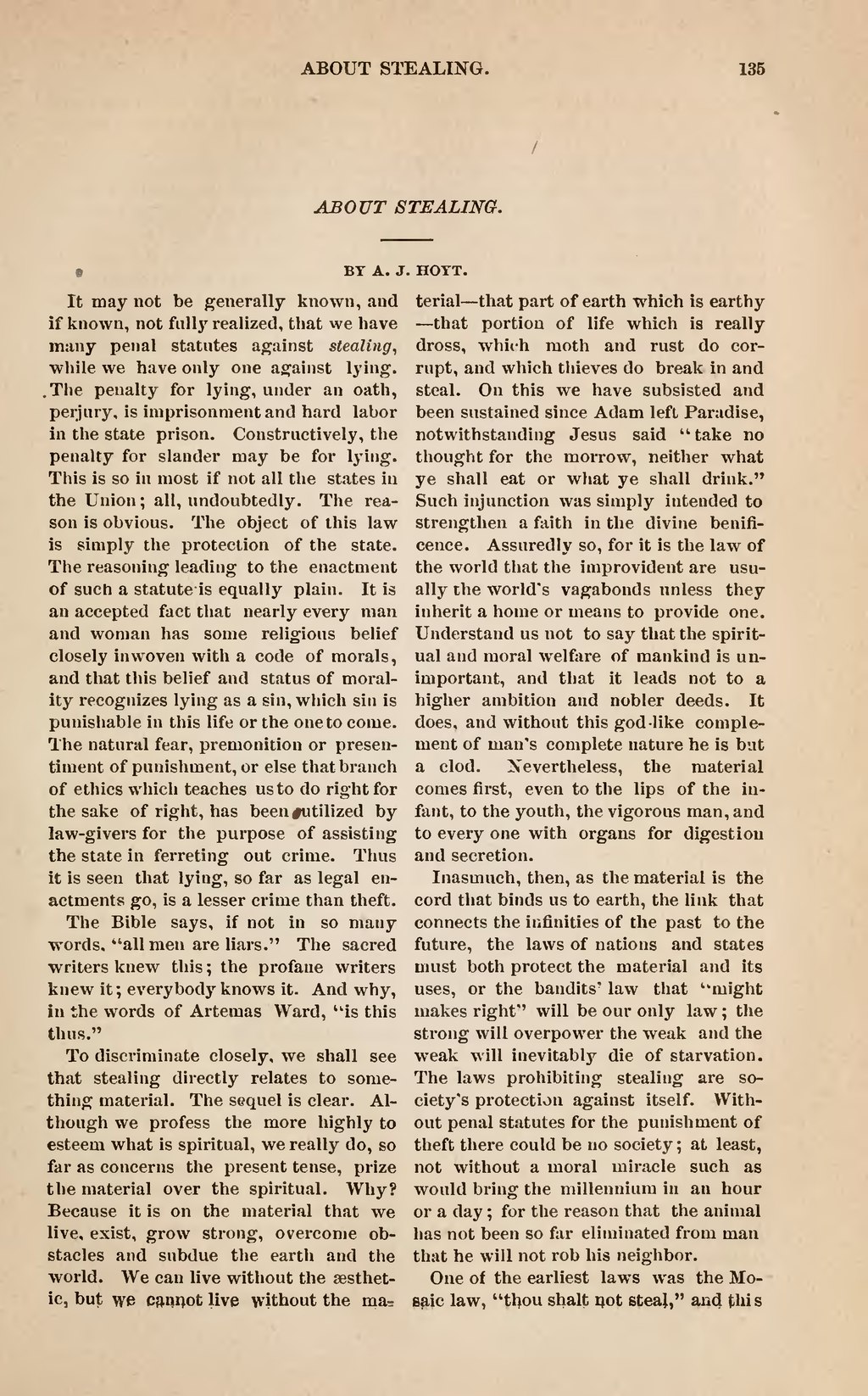ABOUT STEALING.
��135
��ABOUT STEALING.
��BY A. J. HOTT.
��It may not be generally known, and if known, not full} 7 realized, that we have many penal statutes against stealing, while we have only one against lying. .The penalty for lying, under an oath, perjury, is imprisonment and hard labor in the state prison. Constructively, the penalty for slander may be for lying. This is so in most if not all the states in the Union; all, undoubtedly. The rea- son is obvious. The object of this law is simply the protection of the state. The reasoning leading to the enactment of such a statuteis equally plain. It is an accepted fact that nearly every man and woman has some religious belief closely inwoven with a code of morals, and that this belief and status of moral- ity recognizes lying as a sin, which sin is punishable in this life or the one to come. The natural fear, premonition or presen- timent of punishment, or else that branch of ethics which teaches us to do right for the sake of right, has been#utilized by law-givers for the purpose of assisting the state in ferreting out crime. Thus it is seen that lying, so far as legal en- actments go, is a lesser crime than theft.
The Bible says, if not in so many words, "all men are liars." The sacred writers knew this ; the profane writers knew it; everybody knows it. And why, in the words of Artemas Ward, "is this thus."
To discriminate closely, we shall see that stealing directly relates to some- thing material. The sequel is clear. Al- though we profess the more highly to esteem what is spiritual, we really do, so far as concerns the present tense, prize the material over the spiritual. Why? Because it is on the material that we live, exist, grow strong, overcome ob- stacles and subdue the earth and the world. We can live without the aesthet- ic, but we cannot live without the ma?
��terial — that part of earth which is earthy — that portion of life which is really dross, which moth and rust do cor- rupt, and which thieves do break in and steal. On this we have subsisted and been sustained since Adam left Paradise, notwithstanding Jesus said "take no thought for the morrow, neither what ye shall eat or what ye shall drink." Such injunction was simply intended to strengthen a faith in the divine benifi- cence. Assuredly so, for it is the law of the world that the improvident are usu- ally the world's vagabonds unless they inherit a home or means to provide one. Understand us not to say that the spirit- ual and moral welfare of mankind is un- important, and that it leads not to a higher ambition and nobler deeds. It does, and without this god -like comple- ment of man's complete nature he is but a clod. Nevertheless, the material comes first, even to the lips of the in- fant, to the youth, the vigorous man, and to every one with organs for digestion and secretion.
Inasmuch, then, as the material is the cord that binds us to earth, the link that connects the infinities of the past to the future, the laws of nations and states must both protect the material and its uses, or the bandits' law that "might makes right" will be our only law ; the strong will overpower the weak and the weak will inevitably die of starvation. The laws prohibiting stealing are so- ciety's protection against itself. With- out penal statutes for the punishment of theft there could be no society ; at least, not without a moral miracle such as would bring the millennium in an hour or a day ; for the reason that the animal has not been so far eliminated from man that he will not rob his neighbor.
One of the earliest laws was the Mo- saic law, "thou shalt not steal," and this
�� �
